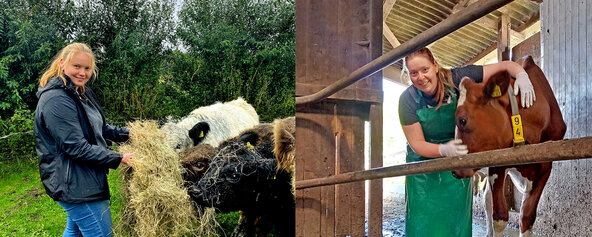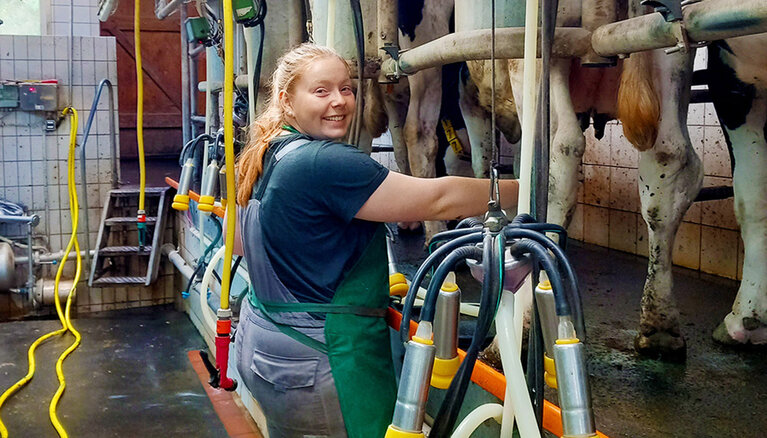
Laura smiles as she watches the bulls feeding. The Galloway fattening bulls are eating hay, but a gust of wind blows a bale onto one of the animals. He waits patiently until it falls of his back, a diverting moment on the family farm. “There’s always something fun going on here,” says Laura, 20. Each family member has their own role and Laura’s job is to look after the milking machines, cows and calves. Her sister Marieke, 22, handles the paperwork and other duties. She does not interfere with Laura’s work – which is what successful teamwork means, if you ask the two sisters. They are alike, with similarities that go beyond their appearance. “We share the same interests,” says Marieke. Animals, nature, technology, working out in the open air – and they both have the same goal, to run their grandfather’s farm in Cappel, Lower Saxony, home to 150 animals. “After we left school, we realized this is what we really wanted to do, but only if we do it together.” Even though they made their decision fairly late compared to other farms nearby, their reasoning is sound. Good workers are hard to nd so the sisters can divide up the jobs that need doing or handle them together. That gives them more free time and a better work-life balance, something that also matters to them both.
It was not necessarily a matter of course that Laura and Marieke Allers would take over the farm. Not many women run farms in Germany, where just 11 percent of all farms are managed by women. That proportion has changed little over recent decades. And yet more and more young women are showing interest in the profession, says Germany’s Federal Statistical Office. The share of women with new training contracts has risen to 22 percent since 2011. So the job is becoming more attractive, though not the job of farm management, something the two sisters cannot explain. “We don’t feel like we have a different perspective as women,” says Laura. Actually, it doesn’t matter whether a man or a woman runs the business, what matters is that you love the job, and keep the farm going, she adds. “But of course, it would be good if more women took the plunge and ran farms.”
Laura and Marieke are preparing to take over the farm by training at the vocational school for agriculture in Schiffdorf and are due to nish their studies in summer. Next comes the master craftsman’s examination at the technical college in two years’ time. Their classmates see the Allers sisters as role models and even the people they know who aren’t involved in agriculture respect what they plan to do. “Everyone tells us that we’re so brave, and they often say it’s because they would not be able t to handle the early working hours,” says Marieke. That was something she had to get used to as well, but her passion for the animals always gets her out of bed. She and her sister are also optimistic about the future. They are aware that dairy farming is facing enormous challenges when it comes to implementing animal welfare guidelines and sustainable production. Their aim is to show people how farming really works. “Consumers have a very old-fashioned image of dairy farms,” says Laura. “They really need to learn more earlier on, to know that we are at the cutting edge of technology and that we are doing more for the environment than many people think.”

She says that makes it all the more important to listen to what farmers have to say. That is something the Allers sisters plan to achieve through projects such as showing children and trainee teachers why milk is so valuable. “They need to see that behind the product is an animal who eats, drinks and needs a place to sleep.” And that comes at a price. It is not yet clear exactly when Marieke and Laura will take over the farm. The whole family discusses major decisions about farming methods and bigger investments. “We just don’t have the experience,” the sisters say. Their father Hauke has plenty of experience though, and he is very proud that his daughters are going to run the business for another generation.

